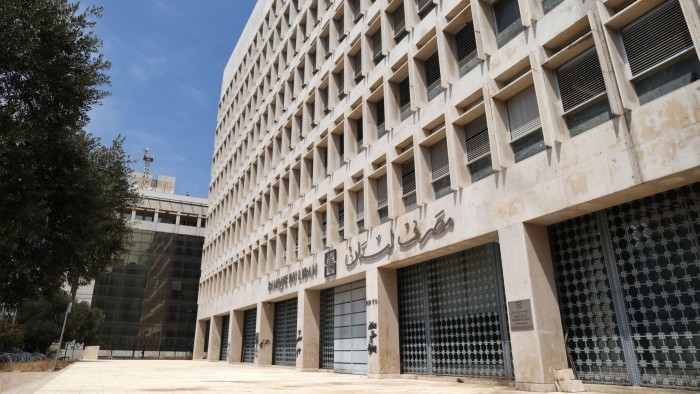Unlock the Editor’s Digest for free
Roula Khalaf, Editor of the FT, selects her favourite stories in this weekly newsletter.
Lebanon’s push to overhaul its banking system has sparked a furious rearguard action by opponents of the IMF-backed reforms that officials say are essential if the country is to recover from a 2019 financial meltdown.
Resistance to the reforms has taken the shape of repeated media attacks and court cases targeting civil society groups — including non-profit research and advocacy organisations — which have sided with the IMF and say they are the victims of a smear campaign.
Lebanese talk show hosts and news channels have accused reformist policymakers, NGOs and journalists who investigated financial corruption of being part of a George Soros-funded conspiracy to harm Lebanon’s economy.
Independent media outlets have also faced multiple legal complaints in what Human Rights Watch called a “weaponisation of criminal defamation laws”.
Lebanon has so far failed to implement most of the reforms demanded by the IMF since the currency lost more than 90 per cent of its value and bank deposits were wiped out in the 2019 crisis, with losses estimated at more than $70bn, in part because of the hostility of leading businesspeople and financiers.
But Prime Minister Nawaf Salam and President Joseph Aoun — who came to power earlier this year after the previously dominant Hizbollah movement was weakened during the latest conflict with Israel — are under pressure from foreign donors to overhaul the banking system. They have vowed to enact the reforms their predecessors did not.
Diala Shehadeh, a lawyer for Megaphone, one of the media outlets facing allegations, described a “political campaign . . . with the goal of defending the interests of the banker class”.
In a sign that the supporters of reform have momentum, parliament last week changed banking secrecy rules to allow increased transparency, while previous attempts had fallen short of IMF demands.
Salam hailed the decision as a “necessary step towards the desired economic reform which our government has pledged to achieve” and fundamental to “holding perpetrators accountable”.
His message contrasted with that of the leading media outlets that have lambasted civil society: they assailed the banking secrecy law as a “betrayal” of depositors and pushed against a clause in the new legislation allowing records from up to a decade in the past to be revealed.
Yet the most contentious reforms are still to come, and the intensifying battle via the media underscores the challenges lying ahead for the new government and its agenda.
To secure a long-sought deal with the IMF, Lebanon needs to pass laws restructuring the banking sector, distributing losses for the 2019 crisis and preparing plans to repay depositors. The polarising question is how much of the burden should be borne by the state versus by commercial banks.
“Specific actors in the banking sector who had the most to lose and the most to hide have been those who are investing more heavily in supporting a certain narrative in the media,” said Ayman Mhanna, executive director of the Samir Kassir Foundation, a Beirut-based media watchdog.
“So far the campaign is not succeeding to actually reach its policy goals. This is why we expect the campaign to continue and to get even more forceful.”
A draft of a banking sector restructuring law has been accepted by the cabinet, and parliament’s finance committee began discussing it this week. But legislation to distribute losses and repay depositors has yet to be approved by either.
The secretary-general of the Association of Banks in Lebanon said this week that the banking sector wanted the draft restructuring law to find “a realistic balance between financial reform and the protection of depositors’ rights”.
Lebanon’s former central bank governor Riad Salameh — whose policies are widely blamed for the crisis — was arrested last year and charged with financial crimes, including embezzlement, which he denies.
Lebanese banks have long been major advertisers on the country’s television channels, whose business models rely on support from bankers and politicians, according to studies by The Policy Initiative, a Beirut-based think-tank.
Multiple media outlets have cast MPs who support the clean-up as agents of a foreign agenda. “A true political-economic octopus lurks in Lebanon,” said one report on Lebanese television channel MTV, calling policy advocacy group Kulluna Irada and news providers Megaphone and Daraj agents of US financier Soros, an accusation they deny. Megaphone and Daraj’s websites list the Open Society Foundation founded by Soros among their funders.
Some of the groups named in such reports have in turn filed legal complaints against MTV.
Daraj, Megaphone and Kulluna Irada have in recent months been subject to legal complaints accusing them of undermining the Lebanese state, which HRW described as an effort to “stifle attempts to shed light on” financial malpractices.
One complaint against Daraj, filed in March 2025 by banker Antoun Sehnaoui, accused the outlet of “harming Lebanon’s foreign relations” and “spreading fabricated news to destabilise financial trust”, according to Daraj’s lawyer.
Neither MTV nor Sehnaoui responded to requests for comment.

